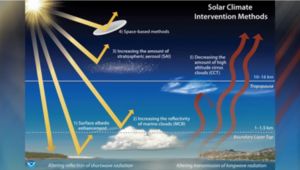Climate Change
Latest European Union rules provide no serious reform or increased capacity to meet the actual challenges ahead
It’s Wednesday and we have discussion on a few topics today. The first relates to the new agreement between the European Parliament and the European Council that was announced on February 10, 2024, which purports to reform the fiscal rules structure that has crippled the Member States of the EMU since inception. The reality is…
The Conservative Party’s Campaign Against Sadiq Khan is Based on a ‘Barefaced Lie’ Which is Designed to Harvest Voters’ Data
The Conservative Party has been accused of running a campaign against Sadiq Khan which is based on a “barefaced lie” which will “panic” Londoners into handing over their personal data.
Londoners will go to the polls on May 2 to choose their next mayor. Polls suggest that the Labour incumbent Sadiq Khan is the strong favourite to win against a challenge from his Conservative rival Susan Hall.
However, Khan’s team fear that a “desperate” campaign by Hall, based on wrongly suggesting that Khan has committed to implement pay-per-mile road charging, could allow her to win the contest.
Proposals for pay-per-mile road charging have been discussed in the past by City Hall, including by Khan’s Conservative predecessor Boris Johnson. Rishi Sunak was also reportedly a previous supporter of such plans.
However, Khan has repeatedly ruled out bringing in pay-per-mile charging, saying again last month that he had “categorically” ruled out any such plans.
Despite these repeated denials, Hall’s campaign have sent out leaflets to Londoners which are designed to look exactly like driving penalty notices and which contain the text “DRIVING CHARGE NOTICE. DO NOT IGNORE. WARNING. THE MAYOR OF LONDON IS PLANNING ANOTHER TAX ON DRIVERS. IF YOUR’RE NOT PREPARED TO PAY THEN SCAN THE QR CODE BELOW”..
Anyone scanning the code will be taken to a website requesting they fill out a “petition” against the new “tax”, which then collects their data.

Hall’s opponents accused her of trying to “panic” Londoners into handing over their information.
“The Conservatives will panic people with this sort of leaflet - it really isn't acceptable” the Liberal Democrat’s London Mayor candidate Rob Blackie said.
Khan’s campaign accused Hall of peddling a “barefaced lie” in a “desperate” bid to win votes.
“These leaflets peddle a barefaced lie” a London Labour spokesperson told Byline Times.
“The Tories are clearly desperate and have resorted to deliberately misleading Londoners. It is nothing more than scaremongering.
“Sadiq has repeatedly, categorically, ruled out pay-per-mile for as long as he is mayor. Londoners will not be duped by these Tory lies."
Political campaigns are required to clearly label their campaign material to alert voters to their source.
However, Hall’s leaflets contain no reference to Susan Hall on the front of the leaflet, and only contain a single small print reference to Hall at the bottom of the reverse side.
The Conservative Party is not mentioned at all aside from a small print reference to 'CCHQ' which is an abbreviation for Conservative Campaign Headquarters.
The linked website does contain a small print reference to the Conservative Party. However, many Londoners receiving the leaflets are unlikely to realise the source of the supposed 'Driving Charge Notice' they have received.
A spokesperson for the Information Commissioners' Office said, "We are aware of issues raised in relation to campaign leaflets and are considering those concerns.
"If a candidate or party asks you to complete a survey or petition, they should be clear how that data will be used in future.
"In many cases, it won't be appropriate for the party or candidate to then repurpose that information for political campaigning."
Independent fact checking organisation Full Fact said in a statement that they were "concerned" by Hall's leaflets.
"We're concerned about these leaflets from the Conservative Party that some of our supporters are receiving through their doors. Deceptive campaign practices can mislead the public during elections - and that’s not on.
"Every voter deserves good information. This is why we’re demanding improvements to the rules around the transparency of campaign materials..."
The leaflets are the latest in a series of misleading claims made by the Conservative Party’s campaign in London. Last month the party deleted a video wrongly claiming that London had become “a crime capital of the world” after it was revealed that it contained a video clip of a terror scare which took place in New York, rather than in London.
Multiple tweets sent out by Hall and the party on X have also been labeled with 'community notes' by users due to misleading claims they have made.
The Conservative party’s former Deputy Chair Lee Anderson was also suspended from the party in February after wrongly suggesting that Khan was in the control of Islamists who were his “mates”.
Byline Times contacted Susan Hall’s campaign to request an explanation, or justification, for the use of their “Driving Charge Notice” leaflets as well as their broader claims about Khan’s plans, but did not receive a response.
A Tidal Wetland Restoration of Epic Proportions
Water may be life, but without salt, the human body cannot retain its benefits. And for thousands of years, a stretch of coastline south of San Francisco has been a vital source of salt.
The South Bay Salt Ponds, as they’re now known, were once thousands of acres of thriving tidal marsh, which formed a natural barrier against regional flooding and provided an important stopover site for migratory birds and habitat for estuary-dwelling flora and fauna. The Ohlone peoples historically harvested salt from the area’s natural deposits, a resource later exploited first by German immigrant John Johnson in the mid-1800s and then by salt-harvesting companies including Cargill, which still operates in the area.
Today, saltwater evaporation ponds sprawl across the area, forming a man-made waterscape that resembles an artist’s palette — courtesy of saline-loving microorganisms that give each pond its richly saturated hue.
The post A Tidal Wetland Restoration of Epic Proportions appeared first on Reasons to be Cheerful.
Millions of simulations show that media companies have too much time on their hands
It’s Wednesday and I discuss a number of topics today. First, the ‘million simulations’ that Bloomberg apparently think show that there is an impending US bond market rout. Second, the way in which neoliberal-inspired legislation ensures the private energy providers can gouge prices and make huge profits in the face of a state-owned alternative. Third,…
How Basic Income Can Support Climate Tech Solutions
The evolution of climate action has reflected the need for affordable options. Universal basic income (UBI) has the unique opportunity to empower everyone to change the world. The warming environment necessitates rapid development and deployment of climate innovations. UBI can provide the accessibility that is crucial to the widespread adoption of solutions like solar panels, […]
Climate Engineering: Doubling Down on Bad Habits
by Gary Gardner

Let’s not mess with such perfection. (Wikimedia)
Social psychologists tell us it takes about 66 days to form a new habit. In my experience that’s only half true. Sixty-six days to form a good habit, yes, but about 66 hours to form a bad one. If I reach for a donut at breakfast, then do the same the next two days, I seal the deal and establish a habit of bad eating. And the dynamic has an insidious way of spreading. Soon I skip workouts, watch too much TV, and succumb to other indulgences. Poor choices beget poor choices, in a rapidly descending spiral.
We might frame climate engineering in the same way, as the latest in a downward spiral of bad economic choices. Our original sin was committing uncritically to growth. Then we doubled down using the power of fossil fuels. Now we flirt with climate engineering, a set of technologies that are expensive, risky, and often unproven, as an extension of our fossil energy addiction. Down the slippery slope we go.
Breaking our bad habit requires that we adopt a strict fossil-fuel-free diet. But we’ve reached a point where may also need some forms of climate engineering—limited and relatively benign—to restore stability to our climate and to reduce climate damage, especially in the most vulnerable regions. In our addiction to growth and fossil fuels we’ve wrought a vexing ethical tangle that will be difficult to sort through.
What is Climate Engineering?
Climate engineering, also known as geoengineering, is an umbrella term covering a broad set of technologies for avoiding dangerous levels of global heating. Analysts generally split the field into two families of technologies, each with a different approach to addressing warming.
Solar radiation modification (SRM) is a strategy for deflecting away the sun’s rays to reduce the heating of our planet. Scientists imagine increasing the albedo (reflectivity) of the earth, say by covering glaciers in Antarctica with artificial snow or planting high-albedo varieties of barley, corn, wheat, or other crops. More exotic options include spraying reflective sulphates into the stratosphere or placing orbiting mirrors in space. Proponents of SRM note that most of the options are relatively inexpensive, at tens of billions of dollars per year for each degree C of cooling in the sulphate-spraying option. And it would provide quick relief from rising temperatures. Other advocates may see SRM as an easy way to skirt emissions reductions and to maintain economies run by fossil fuels. And SRM has serious downsides, described below.

Forms of Solar Radiation Management. (Chelsea Thompson, NOAA/CIRES)
Carbon dioxide removal (CDR) approaches would pull carbon dioxide from the atmosphere, thinning the blanket of heat-trapping CO2 molecules. CDR is a testament to the human imagination, featuring more than a dozen methods of removing excess carbon. Some are nature-based, like planting trees over massive areas. Others are mechanical, like direct air capture (DAC), which uses giant fan-like devices to draw air through adsorbent filters that isolate the CO2, concentrating it for sequestration. Still others alter marine ecosystems by encouraging the growth of carbon-rich plankton (for example, by scattering iron filings through the ocean). The plankton then sink to the ocean floor for a natural burial. All these CDR methods have drawbacks, whether ecological, political, financial, or ethical.
Which approach is best, SRM or CDR? In truth, the question is premature. Before considering any merits of climate engineering, we must tackle the little matter of emissions reductions. This is the elephant in the room in many climate engineering discussions.
The multiple technologies proposed for tinkering with the climate can easily dazzle us. But gee-whiz excitement may blind us to an important fact. None of these solutions addresses the core driver of the climate crisis, the emission of greenhouse gases. None is a complete solution to our climate challenge.
All climate engineering approaches are workarounds that sidestep dealing with emissions. Every one is a temptation to avoid the painful task of building new, carbon-neutral economies. Each makes at best an incomplete contribution to solving the climate crisis.
An honest, fully formed approach to climate policy requires that emissions reductions be not only present, but at the forefront. Climate engineering should play only a distant, secondary role. Even then, only the most benign, ecologically friendly options should be considered.
Fundamental Failure
Remember that geoengineering strategies would not even figure in the climate conversation if humanity had met its responsibility for emissions reductions decades ago. But we didn’t. Between 2000 and 2022, the world’s economies emitted enormous quantities of carbon, equal to 41 percent of the carbon emitted back to 1750. This growth-driven surge boosted concentrations of atmospheric carbon from 370 to 418 parts per million).

Carbon sequestration as nature intended. (Niko photos, Unsplash)
The surge has also tied our hands: Atmospheric concentrations are now so great that emissions reductions alone cannot provide for the 1.5-degree (Celsius) limit on temperature rise set in the 2015 Paris Agreement. Nor are they likely to keep us below 2.0 degrees of temperature increase. In fact, most IPCC scenarios for meeting temperature goals assume some use of CDR technologies to sequester carbon. And the U.S. government seems intent on exploring climate engineering, having provided billions of dollars in subsidies to help boost direct air capture technologies.
In fact, the longer serious mitigation efforts are delayed, the more the mercury rises and the greater the pressure to use climate engineering. More carbon indulgence coaxes us toward more extreme tinkering with Earth systems. Bad habits breed bad habits.
In sum, we err in framing climate engineering as a set of wonder technologies arriving just in time to save us. Instead, they are like crutches, temporary assists that support the hard work of rehabilitation. Our hard work, our rehabilitation of the climate, is to reduce greenhouse gas emissions in a serious way.
What Could Possibly Go Wrong?
As helpful as some limited geoengineering practices may be, policymakers and the public must be clear-eyed about the risks involved. The list of risks is long. Here are just a few:
Rogue actors—What if a nation frustrated over feeble progress in cutting global emissions decided to take climate action into its own hands? It’s not as far-fetched as it may seem given the relative simplicity and affordability of sulphate spraying, at least for larger economies. Kim Stanley Robinson’s The Ministry for the Future imagined just such a scenario, with India suffering mass deaths due to heat and responding by essentially skywriting with cannisters of sulphate. The government, perhaps understandably, frames an exotic and risky venture as necessary to protect its suffering people.
Long-term commitment—SRM in particular could introduce a major new risk. If nations start to reflect away solar rays without serious emissions reductions, they essentially commit to SRM indefinitely. Stopping the practice after a buildup of carbon would produce a spike in global temperature that many species likely could not adapt to. Who has confidence that nations would fund SRM solutions indefinitely to avoid such an outcome?

Would climate engineering be in the interest of this young African? (Seth Doyle, Unsplash)
Unintended consequences—Some measures to restrain global temperature increases could have detrimental effects at the regional or local levels. For example, some forms of solar engineering could cause changes in rainfall in parts of Africa or to the monsoon in India. What safeguards can we put in place to protect vulnerable regions? Are people in those regions part of decision-making on climate engineering?
Resource intensive—For CDR technologies, global-level interventions will require tremendous resources, both financial and physical. Even tree planting is no panacea. Planting 900 million hectares in trees would require the area of 2.74 Indias, raising questions about whose land would be used. Even then, the trees would remove around 8 billion tons of CO2 equivalent. This is just a fraction of the 52 billion tons of CO2 equivalent emitted each year. And young trees absorb far less carbon than mature trees, so the bulk of these gains would not be realized until the second half of the century.
Unproven—In 2023, a panel in the U.N. climate bureaucracy shocked the emerging CDR community when it declared carbon removal technologies “technologically and economically unproven, especially at scale.” It also said that carbon removal poses “unknown environmental and social risks.” Even Ocean Visions, which is bullish on marine-based methods of CDR, acknowledges that many are untried and have unknown effects. This, even as the global community needs climate action urgently.
Finding the Moral Middle
If we were tasked in 1990 to lay out an ethics of climate action, a single sentence would have sufficed. Cut greenhouse gas emissions as broadly and quickly as possible, starting with the biggest emitters. But economic growth and technological developments since 2000 have complicated the picture considerably and put us in an ethical bind. Navigating our choices requires ramping up our commitment to emissions reductions while carefully considering other actions that would keep temperature increases under two degrees.
On curbing emissions, we’ll need to be much less permissive than we’ve been in the past two decades. Electric vehicles, solar panels, and other “clean” technologies are part of this effort, but they carry their own moral hazard. It’s tempting to believe that adopting technological fixes is the extent of our responsibility. But we know that technological solutions alone often backfire and can produce more of the very harms we are trying to reduce.

A good effort in itself, but even a trillion trees wouldn’t finish the emissions-mopping job. (Eyoel Kahssey, Unsplash)
The most direct, broad-based, and cheapest way to cut emissions is to stop the economic growth that fuels it. Policy efforts focused here could yield substantial returns. Some of the draft bills from CASSE’s Steady State Economy Act project (such as the Mileage Fee Act, to be introduced next week) would be helpful steps in this direction.
With a serious commitment to emissions reduction, we can turn to mopping up as much excess greenhouse gases from the atmosphere as is safely possible. Climate engineering solutions should be those that mesh with ecological restoration, like tree planting, restoring wetlands, and designating “blue carbon” areas. The simultaneous contribution to biodiversity conservation makes such efforts a systems solution to the climate crisis. This stands in contrast to the single-issue, reductionist focus that characterizes many climate engineering approaches.
We got into the climate crisis by relying on tunnel-visioned engineering solutions. Let’s not double down on that mistake by tinkering with the climate. Greta Thunberg captures the idea: “A crisis created by lack of respect for nature will … not be solved by taking that lack of respect to the next level.”
Instead, let’s respect nature—and ourselves—and abandon the naïve notions of perpetual growth. We have the option of the steady state economy to fall back upon. It’s the adult thing to do.
Gary Gardner is Managing Editor at CASSE.

The post Climate Engineering: Doubling Down on Bad Habits appeared first on Center for the Advancement of the Steady State Economy.
Reform Parliamentary Candidate Who Shared Racist Content Resigns After Questions by Byline Times
Reform UK recently gained its first MP, former Conservative Deputy Chair Lee Anderson, who defected to the party after claiming that London Mayor Sadiq Khan had handed the city to "Islamists".
Byline Times can reveal that several Reform prospective parliamentary candidates (PPC) have shared content on their social media accounts that is racialised, denies the existence of climate change, or promotes conspiracy theories.
While investigating the party, Reform confirmed to Byline Times that North Bedfordshire PPC Nick Davies had resigned as a candidate "after we spoke to him about the content of his social media".
On 4 March, Davies shared a post which featured the text “evil doesn’t die. It reinvents itself” over pictures of Sadiq Khan and Adolf Hitler. Davies also shared posts in September and October calling immigrants an “invasion” and a “silent army housed in hotels”.
In a statement to this newspaper, the party said: "Reform UK makes a distinction between malice and eccentricity in its activists and its supporters. Malice we take very seriously, harmless opinion is not a problem in a party that believes wholeheartedly in freedom of speech, nor should it be in the wider society."
The recent tweets of Andrew Husband, the Reform PPC for North Durham, on X (formerly Twitter) include an account claiming that “mRNA shots are the most dangerous product ever forced upon the public” and former Conservative (now independent) MP Andrew Bridgen's claim that the COVID vaccine will be considered “the greatest crime against humanity”.
He has also retweeted a video clip of US President Joe Biden talking about building regulations in relation to wildfire resilience and claimed that he had been referencing the roofs of houses that survived wildfires as evidence of the use of “direct energy weapons” to cause wildfires in Texas and Brazil.
The ideology of the 'freedom movement’, the post-lockdown outgrowth of the anti-lockdown movement that posits that reductions in living standards are orchestrated by the World Economic Forum (WEF) as part of a 'Great Reset’, also appeared in material shared by several Reform candidates.
The WEF is the annual gathering of politicians and the corporate executive class at Davos, which became the subject of conspiracy theories during the pandemic.
Maggie Moriondo, the Reform PPC for Bedford, retweeted a post from Wide Awake Media, a conspiracy platform, which claimed that “globalists are using the man-made climate change" lie as a pretext to deliberately collapse the food supply, so people will have no choice but to eat insects and lab-grown "meat".
She also retweeted a post from the same account claiming that broadcaster Neil Oliver “eloquently summarises the global pushback against globalist tyranny”, in relation to a speech he made in which he claimed that there is a “coordinated global conspiracy seeking domination of the world by a handful of ideologues, hellbent on a return to feudalism”.
Dave Holland, the Reform PPC for Mid-Bedfordshire, wrote on his blog that Bill Gates and the WEF “want to reduce the population via the medium of vaccines”. The blog described the movement towards a dystopian future of lockdowns, spiralling inequality and restrictions on civil liberties, and attributed the driving force behind these outcomes to a coordinated effort between governments and corporations to create a “New World Order” overseen by the WEF.
The Reform Party's manifesto rejects "the influence of the World Economic Forum” and contains a pledge to hold a public enquiry into vaccine harms and excess deaths.
Several Reform PPCs were previously Conservative Party councillors or PPCs.
Dr Annie Kelly, a postdoctoral researcher on conspiracy theories and correspondent for the podcast QAnon Anonymous, told Byline Times that, although the Tory Party "has been quite good at message discipline and keeping this stuff under wraps for the time being... I can see a weakened Conservative Party, not in power, being much more malleable to forces like Reform.”
Dr Kelly said that conspiracy theories of the kind promoted by some Reform PPCs often take “legitimate issues” and “point people past who is responsible towards much more shadowy nefarious enemies who can never be defeated”.
She said that the ideology of the 'freedom movement’ has broadened out beyond COVID denial into a “general denialism”.
Another theme across the posts of several Reform PPCs was the denial of the existence of climate change.
Several Reform PPCs have regularly referred to “the climate hoax” and shared content denying a link between human industrial activity and carbon emissions, as well as attacking American climatologist Michael Mann and the 'hockey stick’ graph, which shows a rapid increase in global temperatures since the Industrial Revolution.
On 6 March, Maggie Moriondo posted on X that “we are being fed BS [bullshit] on the climate hoax. We will be force fed a diet of man-made meat whilst elites enjoy the real thing" and reposted a tweet attacking the hockey stick graph as 'junk science'".
Reform PPC for Stockton North, John McDermottroe, shared posts on his Facebook page referring to the “climate hoax” and calling people who believe in climate change as being part of “a cult”. He also wrote a post claiming that the Earth’s temperature began to rise before increases in CO2, which he argued debunks climate models.
Reform PPC for Derby, Tim Prosser, also shared videos denying climate science including by former Fox News host Tucker Carlson.
The Intercontinental Panel on Climate Change calls for a 48% reduction in emissions by 2030 and net zero emissions by 2050, a target that some scientists such as the Climate Change Advisory Group, say is “too little too late”. The Reform Party denies that climate change can be averted by reducing emissions and argues that net zero is “damaging our livelihoods and economy”.
Bob Ward, policy and communications director at the LSE’s Grantham Research Institute on Climate Change and the Environment, told Byline Times that “the material on the Reform UK website is demonstrably false and it’s not just the result of incompetence, it’s disinformation, it’s deliberate misinformation about climate impacts”.
He added that since the Uxbridge by-election, “British media, particularly the Telegraph, Mail and Sun titles and to some extent The Times, have all started championing misinformation about climate policy".
"They largely haven’t gone down the route of promoting outright denial of the physics of climate change, but behind their claims is an implicit denial of the risks of climate change," he added. "You can only say that delaying net zero is a desirable option if you don’t accept the scientists’ assessment of the scale of the problem."
Ward said this has “allowed those with even more whacky views on climate to rear their heads again and start making ridiculous claims about the science”.
Fossil Fuel Cash Is Fracking Democrats’ Climate Support
When President Joe Biden announced in January that he was temporarily halting approvals of new liquefied natural gas exports and processing terminals, Emma Guevara welcomed the news.
A resident of Brownsville, Texas — a historically poor city and fossil-fuel hotspot on the Gulf of Mexico — Guevara is concerned about two multibillion-dollar proposed liquid natural gas terminals for the area. Beyond the projects’ potential impacts on nearby ecosystems, air, and water quality, Guevara is worried about how carbon emissions from the projects would impact the planet — and her home.
“We’re on the coast,” said Guevara, a local Sierra Club organizer. “And we’re a really marginalized community that can barely handle regular natural disasters, let alone what we’re looking at in the next 10 years.”
But Biden’s pause on such fossil fuel projects isn’t just being opposed by Republicans — it’s also facing pushback from some Democrats, including Guevara’s own Democratic Congressman, Vicente Gonzalez.
This is not a paywall. You can read the full story for free.
Just sign up below for a free subscription to The Lever to get access to this story and much more.
Already have an account? Sign in
Electric Boogie Woogie Wagon
Under the banner of “public investment,” yet another giveaway to corporate America.
CFP IAG 2024: Energy Geography and Renewable Energy
We are inviting abstracts for the IAG 2024 in Adelaide for our session on Energy Geography and Renewable Energy.
Energy Geography and Renewable Energy
Organised by: Gareth Bryant (USyd) gareth.bryant@sydney.edu.au, James Goodman (UTS) James.Goodman@UTS.edu.au, Lisa Lumsden (Next Economy) l.lumsden@nexteconomy.com.au, Sophie Webber (USyd) sophie.webber@sydney.edu.au
Sponsored by the Economic Geography Study Group and the Nature, Risk and Resilience Study Group
Transitions from fossil fuels to renewable energy are multilevel and transformative. Energy is rescaled, from distributed and household contexts to new greenfield or ‘brownfield’ wind, solar and storage utilities, regional renewable development modelling, national planning frameworks and global energy and climate policy-making. There is extensive scale shifting by renewable energy corporates and financial institutions as well as by critical climate NGOs and activist networks, that often leverage variations in regulatory regimes or in commitments to decarbonisation. Drivers of transition can be complementary, as ‘co-benefits’, but they can also collide. Much of the renewable sector is privately owned, albeit dependent on state authority, and the priority of maintaining investor returns can take precedence over emissions reduction. Efforts at maximising returns in neoliberal renewables can exacerbate social divisions, negate community or livelihood benefit and prevent wider democratic participation, involvement or social ownership. All these aspects pose problems for renewable energy legitimacy, driving new contestations and new forms of claim-making, including for social ownership and for socio-ecological priorities to take precedence over corporate interests. We seek papers that address how people interpret these and related transitions, how lives are re-ordered and how the meaning and potential of places is thereby transformed. We are especially interested in how the new socio-ecological geographies of energy can be generative, producing new capacity for climate agency and decarbonisation.
Interested presenters should send (no more than) 250-word abstracts, with title, keywords, authors and contact information to the session organisers by Friday March 22. We will notify accepted papers before the IAG deadline.
Cover image: Illustration by Matt Rota for The Transnational Institute
The post CFP IAG 2024: Energy Geography and Renewable Energy appeared first on Progress in Political Economy (PPE).